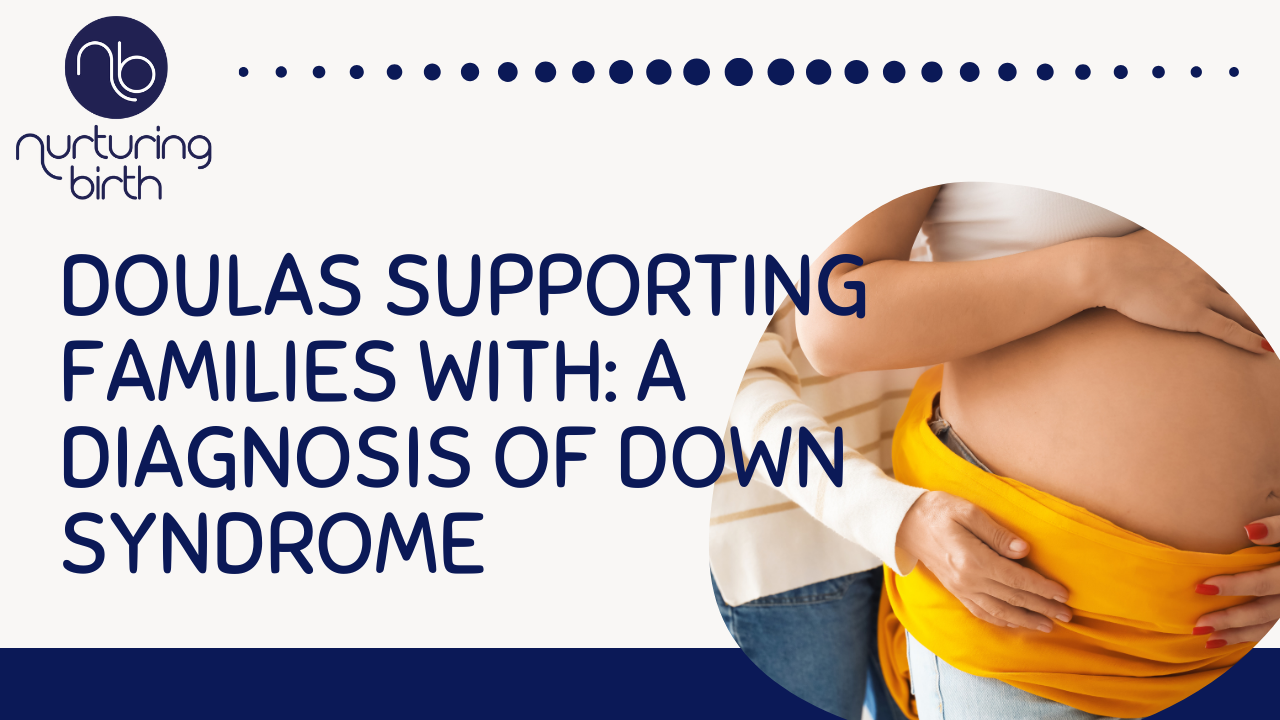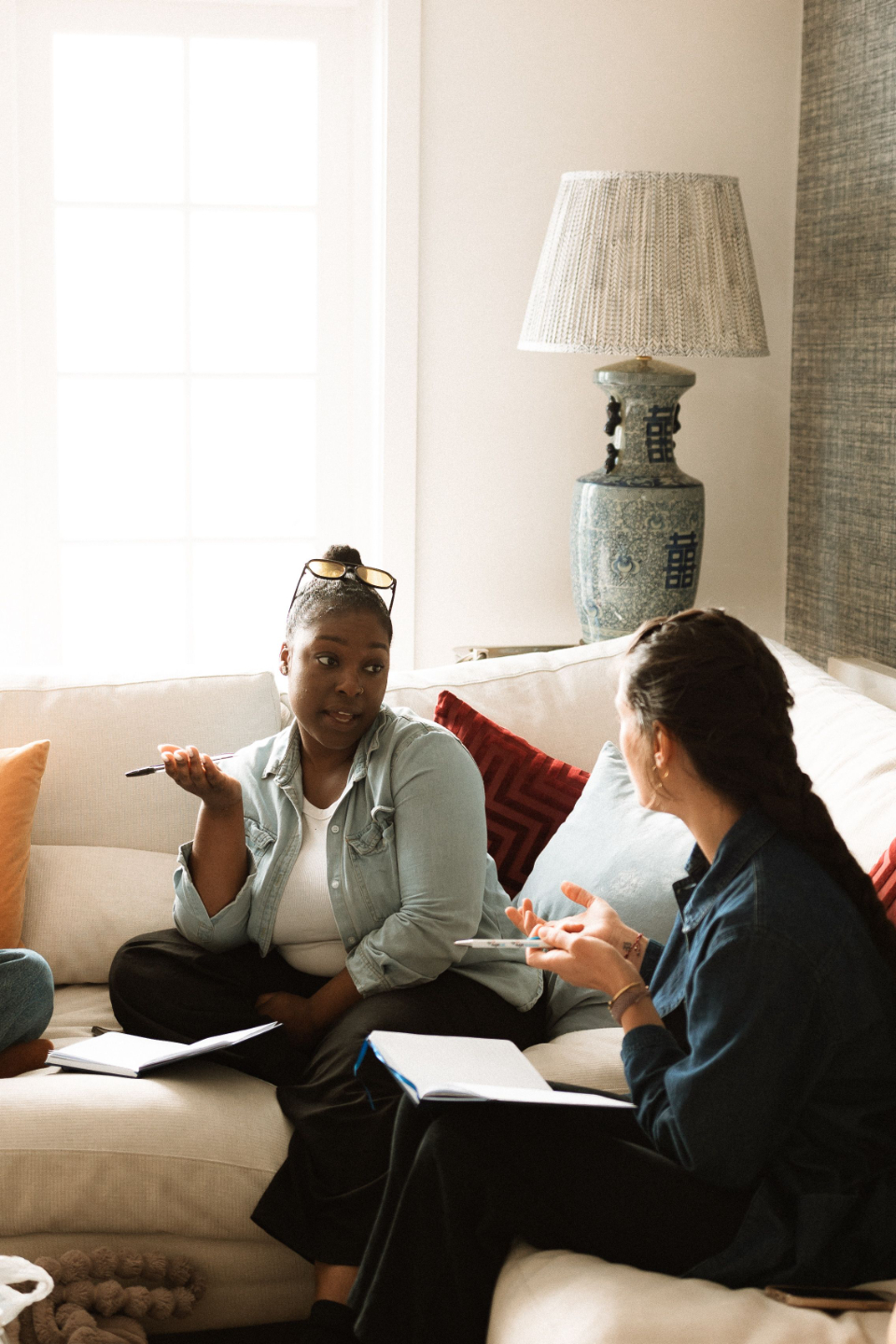
Doulas Supporting Families With: A Diagnosis of Down Syndrome
Jul 18, 2022When a family discovers that their baby has, or may have Down syndrome, it can be news that many people struggle to immediately accept. There is often so much negativity surrounding a diagnosis of Down syndrome during pregnancy that there is often an expectation from family, professionals and wider society that the pregnancy should be terminated.
There has historically been a stigma and fear around raising a disabled child and, tragically, for years people with Down syndrome have been shunned, excluded and segregated. The current statistics in the UK are that 90% of women who find out that their unborn baby has Down syndrome will go on to have a termination.
Pregnant women are often offered a termination in the same conversation as being told that their baby has Down syndrome.
However, in more recent years there is greater acceptance and inclusion in society. Many children with Down syndrome attend mainstream education and lots of adults go on to live independently. People with Down syndrome are now going on to live into their 60s, There couldn’t be a better time to be born with Down syndrome.
This is set to get even better with the recent passing of the new Down Syndrome Bill which will mean that people with Down syndrome will be recognised to have specific needs which need to be met within society.
As doulas, we are in a privileged position where we can help to mould the early experiences that a family has when they receive a diagnosis of Down Syndrome. We can provide a safe space for the family whilst they process news that may leave them scared, in shock and confused. Alongside this emotional support we are also on hand to offer practical support and, of course, signposting.
Down syndrome, otherwise known as Trisomy 2, is a naturally occurring chromosomal arrangement where a person has an extra copy of chromosome 21. It occurs in around 1:800 births. Everyone with Down syndrome will have some level of learning disability and there are some health conditions that can be more prevalent than in those without this extra chromosome.
Down syndrome is often screened for at the 12 week scan so some families will find out early on that they have a high chance of their baby having the genetic difference. However sometimes it is diagnosed after birth if no markers showed up in the pregnancy, or if the screening or testing was been declined in pregnancy.
I have compiled my top 3 suggestion as to what you could wish to know as a doula supporting a family through this experience.
- Language is really important.
We understand that language is so powerful. As Desmond Tutu said ‘Language does not describe reality, Language creates the reality it describes.’ When it comes to Down syndrome, the choice of language used by medical professionals – and everyone else – can have a powerful impact on how a family respond to the news and how they choose to move forward with their pregnancy.
Person-first language is used within the Down syndrome community. This means that we talk about ‘a baby with Down syndrome’ as opposed to ‘a Down syndrome baby’ or worse ‘a Down’s baby’.
The negativity around language often starts from as early as the 12 week scan where screening can still be presented as a 1 in xxx ‘risk’ of Down syndrome, rather than the preferred language of ‘chance’ which has been campaigned about for years. A recent freedom of information request made by Down syndrome U.K. found that 46% of Trusts in England continue to send out letters conveying the results of pregnancy screening tests in terms of the ‘risk’ of a baby having Down syndrome.
As doulas we can offer a balanced perspective if our client receives the news that their baby has Down syndrome. After a birth we can still congratulate them and celebrate their adorable baby and also be there to offer non-judgmental support.
It’s important for the baby to be treated and spoken of as an individual rather than generalised to how people expect babies with Down syndrome to be. It can be frustrating and upsetting for parents to hear such stereotypical statements such as ‘they’re always happy’ and ‘they are floppy babies’.
Another area to avoid is minimising the baby’s disability. Whilst these things are often well meant and come from a place of kindness, it is a form of ableism and often causes feelings of hurt and confusion to the family. It will also be damaging to the child as they grow up. This includes things such as ‘they only have it mildly’ ‘they will be high functioning’ and ‘they don’t look like they have Down syndrome so it won’t be severe’ Anything like this should be avoided.
Taking the family’s lead and supporting their feelings as they navigate the journey that they are on is key.
A mother of a baby with Down syndrome has created a fabulous set of visual cards that explore the importance of language.
https://www.languagecreatesreality.com
2. Knowing where to signpost
Whether your client is pregnant with a baby with a high chance of Down syndrome, has had a confirmed prenatal diagnosis, or has had an unexpected postnatal diagnosis, knowing where to signpost is really helpful.
During pregnancy, your clients may wish to explore their options. As always, informed choice is of upmost importance. We know that many families are steered towards a termination from some medical professionals, and they are often presented with a worse-case scenario as to what life with their child may look like. It’s so important for clients to know that there are other sources of information.
There are many local and national organisations offering support and information from a real-world perspective. Finding out where your closest Down syndrome organisation is so that you have it on hand to signpost families to would be really valuable. Many of them offer support such a coffee mornings, training and courses, early intervention therapy and some even have gift bags for new parents to welcome them to the community. They can also connect families during pregnancy to a local family who has a child with Down syndrome, as it can often be helpful to meet and see a real-life picture of what life could be like rather than a list of possible medical issues and a diagram.
Positive About Down Syndrome is a national charity that provides information and training to parents and professionals. It also provides a lot of peer support and expertise to families of babies and children with Down syndrome. There is a fantastic pregnancy support group on Facebook for expectant families which is a safe space and entirely non-judgmental. There is also a new parents group offering the same support and is a great way for families to meet other people who are sharing their experiences. The links to these groups are below:
Pregnancy group
https://www.facebook.com/groups/dsukpositiveaboutdownsyndromegreatexpectations/
New Parents Group
https://www.facebook.com/groups/padsnewparents/
We know that when families get a diagnosis they often feel very alone and isolated. For most people, they won’t know other people who have been through the same experience so it can be a lonely time. Connecting into a community can make all the difference in wellbeing and mental health.
You can find your local Down syndrome support group here:
https://downsyndromeuk.co.uk/support-groups/
3. Recognising that breastfeeding can take longer to establish.
There is a myth commonly shared to parents that their baby with Down syndrome will not be able to breastfeed. This is not true, babies with Down syndrome can breastfeed successfully, however in some babies it can take longer to establish. Knowing this can help to manage expectations and promote a successful breastfeeding relationship.
A survey conducted by Positive About Down Syndrome in 2021 showed that 46% of women were advised by a health care professional that they may not be able to feed their infant purely because of the baby having Down syndrome. 54% advised that they did not receive the support they needed from their midwifery team.
The breastfeeding struggles can be split into two distinct areas: societal and physiological. Societal would be the assumption that the baby will not breastfeed. Basic position and attachment can be overlooked, assumptions made that problems breastfeeding are because the baby has Down syndrome. It can also be assuming that the baby isn’t gaining weight as they should be because the Down syndrome specific growth chart hasn’t been added to the baby’s red book and therefore there may be pressure to top up with formula. (Note: Down syndrome specific growth charts should be used for babies with Down syndrome!)
Some of the physiological problems a baby can have with breastfeeding as a result of having Down syndrome are low tone (hypotonia), sleepiness in the early days, and delayed suck/swallow mechanism. There are breastfeeding positions and techniques that can support babies with low tone, and other supports such cup feeding, finger feeding, supplementary nursing systems. Support around expressing, whether it be short term or for a longer time is also something to explore and be aware of.
You can find a list of breastfeeding resources specific to babies with Down syndrome here:
Positive About Down Syndrome also have a breastfeeding group on Facebook:
https://www.facebook.com/groups/dsukpadsbreastfeedingpeersupport/?ref=share
As doulas supporting families whose baby has, or may have, Down syndrome, we can make a huge difference to their experience. Hopefully this article will help you to feel ready and able to help clients with a baby with Down Syndrome.
Sarah is based in London and is a mum of four, including a son with Down syndrome. She trained as a doula with Nurturing Birth and is a breastfeeding coordinator for Positive About Down Syndrome.
Learn more about the Nurturing Birth Doula Training Experience
Free download available NOW!
We hate SPAM. We will never sell your information, for any reason.


